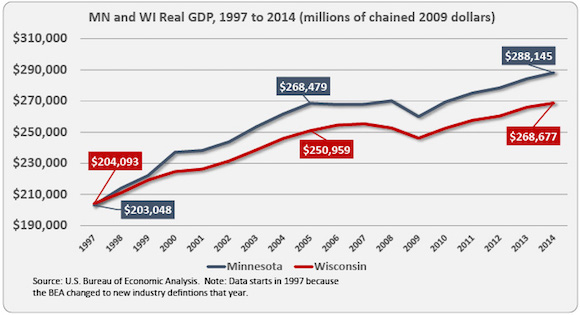Democrats have become fond of contrasting the economies of Minnesota, ruled with an iron fist by the Democratic Farmer Labor party, and Wisconsin, home of Scott Walker’s reforms. President Obama and many other progressives have claimed that Minnesota’s economy is doing better than Wisconsin’s, thereby demonstrating the superiority of liberal policies. In a post at the Center of the American Experiment’s web site, Peter Nelson notes how common this theme has become. Links in the original are omitted:
[Minnesota Governor Mark] Dayton raised taxes by over $2 billion, increased spending by over 10 percent per person and hiked the minimum wage. At the same time Walker cut taxes and ended collective bargaining requirements for public employees. As the Milwaukee Journal Sentinel put it, “Wisconsin is getting its most conservative governance in decades. Minnesota is getting its most liberal governance in decades.”
…
Despite the fact that Dayton’s tax the rich, spendthrift policies have barely been in place for two years, liberals are already claiming victory.In fact, liberals began claiming victory as early as 2013, well before any Minnesotan filed a tax return under the state’s new fourth-tier tax rate. Larry Jacobs, a professor at the University of Minnesota Humphrey School of Public Affairs, was one of the first out of the gate with a column in the New York Times. Though he admitted “firm answers will require more time,” that didn’t stop him from making comparisons and concluding “Minnesota is building a modern progressivism that plows a hopeful path.”
More recently, former Minneapolis Mayor R.T. Rybak penned a Star Tribune column claiming Walker “destroyed [Wisconsin]’s economy,” which was followed by President Obama’s trip to La Crosse, Wisconsin where the President himself declared, “Minnesota’s winning this border battle.” Liberals simply can’t get enough of comparing Dayton and Walker. Here’s just a few more outlets declaring Dayton the winner: The American Prospect, LaCrosse Tribune, Mother Jones, and Huffington Post.
But is there any empirical basis for the liberals’ claims? No. First, Nelson points out, “Minnesota’s economy pulled ahead of Wisconsin’s well before Dayton and Walker took office.” This chart shows that the two states’ real GDPs were virtually equal from 1997 through 1999, at which time Minnesota started growing faster. Since then, there has been no significant change. By 2005, Minnesota’s economy was 6.53% larger; in 2014 it was 6.76% larger:
Nelson points out that “other measures of economic performance, such as per capita personal income or employment, [also] show Minnesota began improving relative to Wisconsin a long time ago.” So the claim that Scott Walker “destroyed Wisconsin’s economy” is false.
But an equally important question is, how are Wisconsin and Minnesota doing with respect to the other 48 states? Relative to one another, they have been moving in lockstep in recent years, but is their performance good, bad or indifferent? Peter Nelson offers a second chart to answer that question:
Both Minnesota and Wisconsin have lost ground (albeit not much) relative to other states since 2003. Nelson concludes:
This strongly suggests neither state has the ideal mix of policies in place to compete for a larger portion of the U.S. economy. Minnesota is therefore no example to the nation of a progressive policy triumph. Instead, the main takeaway here should be that Minnesota can do better.
There is much more to be said on this topic, and the Center of the American Experiment is the place where it will be said. For now, let’s just note that the Democrats’ claim, that the Minnesota/Wisconsin comparison shows the superiority of liberal policies, is false.


Notice: All comments are subject to moderation. Our comments are intended to be a forum for civil discourse bearing on the subject under discussion. Commenters who stray beyond the bounds of civility or employ what we deem gratuitous vulgarity in a comment — including, but not limited to, “s***,” “f***,” “a*******,” or one of their many variants — will be banned without further notice in the sole discretion of the site moderator.